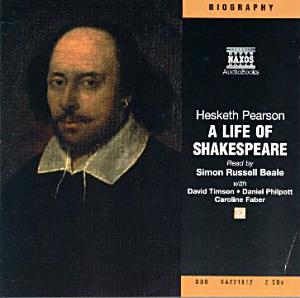Audio Book Review
A LIFE OF SHAKESPEARE By Hesketh Pearson read by Simon Russell Beale
with David Timson, Daniel Philpott and Caroline Faber.
NAXOS NA 221612 2 CDs [2:36:57]

From the very first the film industry has turned to the 'immortal bard' for screenplays – original and adapted – yet history tells us little of the man himself. Hesketh Pearson's biography is as factual as one can get. Pearson's is a very personal interpretation of Shakespeare's life, appropriately, from the viewpoint of a man of the theatre. He brings an actor's eye to the commentary on the texts.
The story begins with Shakespeare's childhood and his father's chequered prosperity in Stratford-upon-Avon. Shakespeare was largely self-taught. He married Anne Hathaway 8 years older than himself when he was just 18. (It is believed that they had pre-marital relations.) Law was his early career but his interest and attention was seduced away by the many troops of theatrical players that regularly paraded through the streets of Stratford (in 1587 five leading companies visited the town). He began as a 'Jack- of-all-trades' in the theatre before rising rapidly from call-boy to actor working in London theatres and inn yards
Shakespeare, at this time, was seen as 'handsome and well-shaped'; honest, candid, yet hyper-sensitive, but extremely witty. He was well-liked and prone to sensual indulgence. Once he had a rival (another actor) in love. When the rival arrived at the lady's abode he saw Shakespeare leaning out of an upstairs window jibing: William the Conqueror was before Richard III!
His writing experience began with 'improving others' dramas'; e.g. after the murder of Marlow 1593 in a Deptford tavern, he reworked Marlowe. His own earliest big success was Henry IV mainly because of his comic character, Falstaff whose lines were widely quoted. Other comparatively early successes were: The Taming of the Shrew, The Two Gentlemen of Verona, The Comedy of Errors, A Midsummer Nights Dream , The Merchant of Venice, Richard II, and Romeo and Juliet.
He prospered and was able to buy the best house in Stratford
Shakespeare had to pay due regard to the sensibilities of Queen and courtiers. Elizabeth was a tyrant, Shakespeare was a free man. Shakespeare hated her and sensed rebellion was in the air. Essex's escapades in Ireland and his plotting against Elizabeth indirectly inspired Shakespeare's Julius Caesar in which the characters are political types. Interestingly there were no more joyous comedies; henceforth the plays deepened and darkened after Essex's capture and beheading.
Shakespeare had no need to criticise James I because the new monarch became a patron of Shakespeare's company and supported his productions all over the country. This was the time of the great tragedies: Hamlet, Othello, Macbeth and King Lear. By 1609, Shakespeare had reached the highest peak of fame and prosperity; his Sonnets were published but his last plays re-entered the kingdom of dreams including: A Winter's Tale and The Tempest.
After retiring from the stage Shakespeare settled in his last years in Stratford.
The narrative is read flowingly and commandingly by Simon Russell Beale with quotations for the sonnets and plays read by David Timson, Daniel Philpott and Caroline Faber. In between there are musical excerpts by Gibbon and Dowland.
An absorbing documentary and an interesting background to those Shakespeare film and TV adaptations.
Ian Lace
[No rating]
Return to Index